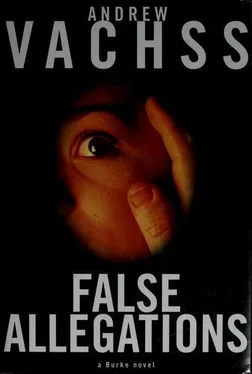"With regard to her hair–pulling," he rolled on, refusing to be derailed, "both in her reporting to me and in her projective testing, she had confusion about intimacy, sexuality, and pain. Hair pulling—we have some on tape—was associated with the same decrease in heart rate that a dissociative response was. In other words, she does it because it soothes her. For Jennifer, it's like taking a little hit of morphine every time. The confusion about what is soothing and what is arousing, of course, makes her vulnerable to sexual exploitation. I'm sure you've seen that before."
"I've seen it cut both ways," I told him.
"It can," he agreed. He leaned back in his chair, rotating his head slightly as if he was working out some kinks in his neck. Then leaned forward, elbow on the desk, cupping his chin in his hand. "With regard to trauma…it's clear from both her history and the corroborating neurophysiological reactivity—and her symptom constellation—that she has been exposed to multiple trauma at different times in her childhood, certainly some coming prior to adolescence."
He took a deep breath, looking me full in the face. "I'm told that you have considerable investigative experience in this area, Mr. Burke. What's your gut instinct?"
"That it happened," I told him flat out. "That she's telling the truth. That she was a damaged little girl. That this Brother Jacob sniffed her out like a shark spotting a belly–up fish. And that he had sex with her when she was a kid."
"Me too," he said, holding out his hand to shake, telling me we were done talking.
Icouldn't think of another rock to turn over. Truth is, I believed her the first time I heard her. It was only Kite who kept me going, following every spot of blood on the tracks. It wasn't the money. I know how to go through the motions without actually doing anything. And I know more about killing time than a Peeping Tom knows about backlighting.
Later, when I was thinking about it—when I was trying not to think about it—I snapped to what had been going on, why I had been working so hard. I was finding the truth. Truth doesn't mean much to a con man. It's all presentation, not substance. Kite showed me what he had, put it right on the table. When it started, all I wanted was to get him off my back. And take his money. That's what I told myself.
He was an evangelist, I knew that. I didn't realize I'd become the congregation until I was down too deep.
And by the time I came out the other side, there was nothing to do but go with what I really knew.
"Please don't do that," Kite said.
"Do what?"
"Stare so deeply into my eyes—it's not polite. I suffer from nystagmus, and your staring makes me uncomfortable."
"Sorry," I lied, sitting in that butterscotch armchair. "Anyway, it's the real deal. It checks out every way there is."
"You're sure?" he asked softly. "There's no mistake?"
"Unless there's some more evidence lying around, I got it all," I told him.
His eyes flared behind the pink glasses. "Do you believe there might be some?"
"Might have been," I said. "But this Brother Jacob character won't be stupid enough to hold on to it. I'm done digging—there's no pay dirt left."
"Is there anything else? Anything you haven't turned over?" he asked, one long finger tapping a thick stack of documents on the little round table to his right.
"Just this," I said, pulling a list of names and addresses out of my jacket pocket. "It's not the coffin, but, with everything else, it's damn sure another nail."
I handed it over. He scanned the list, shaking his head. "I don't see what this—"
"Third page, fourth name from the top," I told him.
"'Russell J. Swithenbrecht.' A post office box in Erie, Pennsylvania. What does that have to do with—?"
"That's him," I said. "Brother Jacob. He keeps the box under that name. Drives over about once a month. Only takes about an hour and a half, two hours tops. Always the same way. Drives there on a Friday night, stays over, hits the box Saturday morning—the branch is only open until noon. Then he drives back to Buffalo in time for his regular sessions on Saturday afternoon. Been doing it for years."
"And that proves…?"
"What you have in your hands is a printout of a subscription list," I said. "For a little magazine called Unique Yearnings ."
Kite's eyebrows lifted into a question.
"Girl–lovers, they call themselves," I told him. "Little girls."
"We have found the truth," Kite said, looking up directly into my eyes.
I could feel Heather standing behind me—feel the heat coming off her.
Imet Morales in Bryant Park, right behind the Public Library, a block from where the heart of Times Square would be if it had one.
"This guy I'm looking at for Kite. If you ever hear anything—"
"What you got so far?" the cop asked.
It took another six weeks to assemble the ingredients. Then Kite dropped the bomb. Jennifer Dalton sued Brother Jacob in New York County Supreme Court. For twenty–five million dollars. Her complaint alleged sexual abuse, statutory rape, sodomy, extortion, intentional infliction of emotional distress, assault, battery, pastoral malpractice, and half a dozen other charges. The Psalmists were not named in the lawsuit—it was all Brother Jacob.
I caught it on the news, a thirty–second clip from a press conference called to announce the litigation. "Yes, we understand that these events occurred some time ago," Kite was saying smoothly, looking implacable and immaculate in a dark–chocolate double–breasted suit. "And while it is too late for the criminal justice system to act, we believe it is time for New York to join other, more progressive jurisdictions in providing a civil remedy for a child driven into a psychiatric coma by the deliberate, predatory acts of a sexual abuser. We are prepared to prove that the perpetrator's conduct was calculated to assault and impair the victim's reality–testing. This was no accident. It has happened time and time again. It is happening as we speak, to children all over this country."
The newspapers ran with it heavy, Kite piling on fact after fact, every detail displayed for the public, holding nothing back. They even broke out one of Kite's quotes in a black–bordered box in the middle of the article: "The statute of limitations was designed to be a shield to protect the innocent from claims filed so late that the evidence had disappeared. But now it is being used as a sword, a sword to attack the weakest, most vulnerable members of our society. When it comes to child sexual abuse, the statute of limitations has no place in a civilized society. This case isn't about the law. This case is about the truth."
The lawyers for Brother Jacob kept saying they didn't want to try their case in the press. But Kite kept up the assault, wondering out loud who was paying for Brother Jacob's defense. Tabloid TV reporters surrounded the house in Buffalo, blanketing the neighborhood for the usual empty quotes. Brother Jacob moved to an undisclosed location. A spokesman for the Psalmists appeared on a talk radio show. When he said something about the suffering of Job, the board lit up with enraged callers demanding to know if Jennifer's suffering meant anything. When the Psalmist spokesman tried to explain the church's position, the radio host called him a dirtbag and kicked him off the show.
Kite's legal papers ran almost three hundred pages, counting exhibits. Photocopiers at the courthouse pumped around the clock. The document became a best–seller overnight, turning up at coffeehouses and society parties and college campuses. Some commentators wondered out loud if Brother Jacob could ever hope to get a fair trial. And their colleagues pounded back, wondering with even more vehemence if Jennifer Dalton would ever get justice.
Читать дальше











